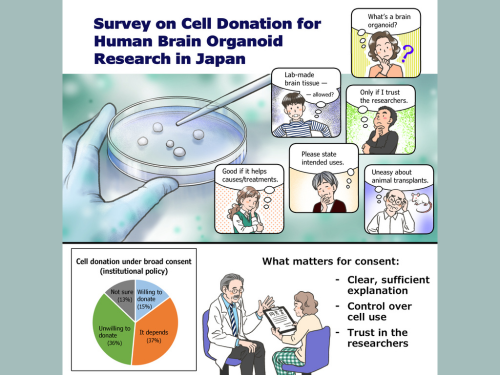Inquiries on the study
Tsutomu Sawai
Professor (Special Recognition), Hiroshima University Graduate School of Humanities and Social Sciences
E-mail: tstmsw * hiroshima-u.ac.jp
(Note: Please replace * with @)
Masanori Kataoka
Contributing Associate Professor, Hiroshima University Graduate School of Humanities and Social Sciences
E-mail: kataokam * hiroshima-u.ac.jp
(Note: Please replace * with @)
Inquiries on the story
Hiroshima University Public Relations Office
E-mail: koho * office.hiroshima-u.ac.jp
(Note: Please replace * with @)
New study argues standard forms of consent for cell donations would not be appropriate for this line of research

A new study found that most Japanese citizens hesitate to donate their cells for brain organoid research under current “broad consent” systems. The research suggests adopting a project-specific consent model for ethically sensitive research topics.
(Credit: Yukari Mishima)
Research on human brain organoids (HBOs) is directly challenging how biobanks and biomedical institutes recruit volunteers. That is what a new study by Japanese researchers in Frontiers in Genetics concludes after finding that the Japanese public overwhelmingly rejects the common practice of broad consent when their donated cells could be used to create HBOs. This attitude jeopardizes recruitment and calls for an alternative form of consent that follows the project-specific consent model.
Researchers can culture donor-derived cells in the laboratories to create three-dimensional, self-organizing structures that closely mimic human brain development. These are known as HBOs. While they offer unprecedented insight into neurological diseases, the technology is not without ethical issues.
“HBOs are fraught with controversy, because it is believed with future research that they will develop the capacity to think and have consciousness,” said Hiroshima University Professor (Special Recognition) Tsutomu Sawai, one of the authors of the study. “It is not unreasonable to conclude that donors could not have imagined this possibility when consenting to donate their cells to science.”
Currently, donors typically provide broad consent, agreeing to have their cells used for a wide range of future experiments, including those not possible at the time of donation.
To test public attitudes towards HBO research, Sawai and his colleagues conducted a survey on HBOs recruiting over 300 Japanese residents. Notably, they found that more than 90% of participants were unaware of HBOs prior to the survey.
After an explanation about this biological technology, the team asked the participants for their willingness to donate cells under the current broad consent model. The public response suggested a need for change: nearly three-quarters of respondents expressing serious hesitation or outright refusal, with 36% outright refusing to donate their cells under broad consent and another 37% saying their willingness would depend on specific conditions, such as the purpose and ethical use of the cells. Only 15% were willing to give broad consent after learning about HBOs.
An analysis of the reasons for this reluctance indicates that for morally complex areas of research, donors prioritize understanding the purpose, potential benefit, and ethical safeguards of the research, as well as the trustworthiness of researchers, before volunteering their cells. These findings are consistent with interviews and workshops on HBOs taken in European countries and the US, making this a global challenge for current practices in cell donation.
To maintain public trust and a vital donor pool, the study concludes that organizations relying on volunteers offering cell samples should adopt project-specific consent for ethically sensitive research topics.
“This consent empowers the donors with the decision only after fully understanding the details of the research,” Hiroshima University Contributing Associate Professor Masanori Kataoka said. “Importantly, it respects the moral view of the donor, which we believe is more likely to encourage donations.”
About the study
Journal: Frontiers in Genetics
Title: Japanese attitudes toward cell donation in human brain organoid research: many oppose broad consent
Authors: Masanori Kataoka, Mayu Koike & Tsutomu Sawai
DOI: 10.3389/fgene.2025.1606923
- Profile of Professor (Special Recognition) Tsutomu Sawai / Graduate School of Humanities and Social Sciences
- Profile of Contributing Associate Professor Masanori Kataoka / Graduate School of Humanities and Social Sciences

 Home
Home














